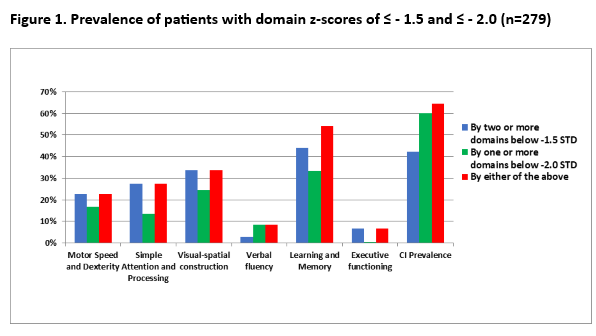Session Information
Session Type: Poster Session (Monday)
Session Time: 9:00AM-11:00AM
Background/Purpose: Systemic Lupus Erythematosus (SLE) can lead to a number of neuropsychiatric manifestations including cognitive impairment (CI). Previous meta-analyses have reported the prevalence of CI at 38% (95% confidence interval: 33-43%), with a range of 15-79%. We aim to report the prevalence of CI in a lupus cohort as assessed by a comprehensive neuropsychological battery (NB) of tests. Additionally, we were interested in exploring differences in demographic, clinical and serological characteristics of SLE patients in an inception cohort, with and without CI.
Methods: Consecutive consenting patients aged 18-65 years, who attended a single center were enrolled (Jul 2016 – Mar 2019). Each patient completed a comprehensive NB evaluating six cognitive domains including: manual motor speed and dexterity, simple attention and processing, visual spatial construction, verbal fluency, learning and memory (verbal and visuospatial) and executive function.
Using age- and gender-stratified normative data, patients were classified on the ACR NB as having CI if a z-score of ≤-1.5 was observed in ≥ 2 domains or z-score of ≤ -2.0 on ≥1 domain; otherwise non-CI. Further, patients with CI (z-score of ≤ -1.5 on ≥2 domains) were compared to non-CI patients.
Results: : 279 patients were included in this study, 89.6% comprised of females. The average age and SLE duration at enrolment were 41.2 ± 12.2 and 14.1 ± 10.1 years, respectively. The prevalence of CI was 42.3% (z-score of ≤ -1.5 on ≥2 domains) and 60.2% (z-score of ≤ -2.0 on ≥1 domain).
The most affected domains were learning and memory, and visual spatial construction – prevalence of 44.1% (n=147/279,) and 33.3% (n=94/279,) respectively. Prevalence of impairment in visual spatial construction was 33.8% (n=94, z-score of ≤ -1.5 on ≥2 domains) and 24.5% (n=68, z-score of ≤ -2.0 on ≥1 domains). The least affected domains were verbal fluency, and executive function. Prevalence of impairment in verbal fluency was 2.9-8.6% (z-score of ≤ -1.5 on ≥2 domains, z-score of ≤ -2.0 on ≥1 domains). Prevalence of executive function impairment varied between 0.4-6.8% (z-score of ≤ -2.0 on ≥1 domains, z-score of ≤ -1.5 on ≥2 domains).
There were no differences in demographics, medication use, disease duration and activity, and serologic markers between those with and without CI [using the definition of CI as z-score of ≤ -1.5 on ≥2 domains].
Conclusion: The pooled prevalence of CI in this cohort varied with different definitions of CI (44.3%-60.2 % [z-score of ≤ -1.5 on ≥2 domains, z-score of ≤ -2.0 on ≥1 domains]). There is an unmet need to standardize the metrics and the definitions for CI. CI is identified across all cognitive domains with particularly high prevalence in learning and memory.
To cite this abstract in AMA style:
Moghaddam B, Beaton D, Green R, Tartaglia M, Ruttan L, Kakvan M, Fritzler M, Choi M, Zandy M, Su J, Vitti M, Bonilla D, Wither J, Lombardi S, Touma Z. Prevalence of Cognitive Impairment in an Inception Lupus Cohort as Assessed by a Comprehensive Neuropsychological Battery [abstract]. Arthritis Rheumatol. 2019; 71 (suppl 10). https://acrabstracts.org/abstract/prevalence-of-cognitive-impairment-in-an-inception-lupus-cohort-as-assessed-by-a-comprehensive-neuropsychological-battery/. Accessed .« Back to 2019 ACR/ARP Annual Meeting
ACR Meeting Abstracts - https://acrabstracts.org/abstract/prevalence-of-cognitive-impairment-in-an-inception-lupus-cohort-as-assessed-by-a-comprehensive-neuropsychological-battery/


